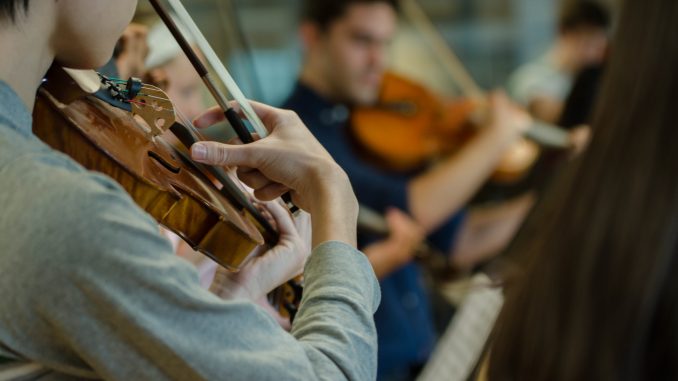
Although Charles Parker Jr. is a music educator, his job is a lot like that of a doctor or pharmacist, said his colleague, conductor Aaron Picht.
“He has to diagnose, and then he has to prescribe,” Picht, a conductor in the Center for Gifted Young Musicians, said on how Parker organizes students into chamber ensembles. “He has to figure out, ‘Oh, these guys are at about the same place musically and they’ll get along.’”
Parker is the coordinator of chamber ensembles at the Center for Gifted Young Musicians, a position he has held since the advent of the center in 1986. The center is housed within Temple Music Prep, a division of the Boyer College of Music and Dance that offers non-credit music and dance programs to the public.
The center was formed when Boyer merged with the New School of Music in Philadelphia. The New School’s 50 full-time students and four full-time faculty members were incorporated into a new department of ensemble and orchestral studies. Within this department, the New School Institute was formed to maintain student records, archives and special ensemble initiatives, said Richard Brodhead, the director of the New School Institute and former acting dean of the Boyer College of Music and Dance.

Nancy Hess, then-director of Temple’s Music Preparatory Division, hired Parker as the chamber ensemble coordinator in response to “the huge influx of really talented young musicians” from the New School’s preparatory division, Parker said.
“Before [the New School merger], there was an orchestra, there was some chamber music that was a part of Temple Music Prep, but the level of playing skyrocketed that one year,” Parker said.
Since the center’s inception, Parker has seen many of his students develop into his professional peers. Alumni include members of the Philadelphia Orchestra as well as violinist Sarah Chang, a Juilliard student at age six and New York Philharmonic soloist at age eight.
Picht said he views Parker’s dedication to the students as instrumental to the program’s continued success.
“It’s unusual to find a professional musician who deeply cares enough about grooming and helping young talent that they’re going to spend every Saturday afternoon doing this kind of thing,” Picht said. “A lot of people teach for money and I know that [Parker] teaches for the love of music and of the kids.”
Within the last 15 years, Parker has seen some changes in the lifestyles of his students. Fewer are homeschooled, Parker said, which was once a common practice “to give them more time to practice and to focus on their music.”
Mark Huxsoll, the executive director of Temple Music Prep, said another change has been scheduling. Rehearsals, which are usually planned for Saturday afternoons, now have to compete with other student activities.
“The competition [for time] is not with other music institutions necessarily, but … science fairs and robotics competitions and debate clubs and [athletics],” Huxsoll said.
The quality of music education in public schools has also suffered, Parker said.
“When I was growing up [in Havertown], my township had six elementary schools. Each elementary school had an orchestra. It was just such a fertile ground for music,” Parker said. “Now they have barely one orchestra in the school district.”
For him, this decline has affirmed the importance of the center.
“Now, there are very few other options for [serious students],” Parker said. “The school system can’t really provide what we can and I would not be surprised if our students start coming from further distances.”
Despite the cutbacks in funding for public school music programs, Parker said the center’s commitment to preserving Philadelphia’s musical heritage persists today.
“When I was a kid, names like Jascha Brodsky, Orlando Cole, they were the gods in Philadelphia of music,” Parker said, referencing members of Philadelphia’s Curtis String Quartet. “It’s a heritage, it’s a lineage, and I think that’s what we are trying to keep.”
Parker studied with Ivan Galamian, “the greatest violin teacher in history” said Robert Mann, a founding member of the Juilliard String Quartet. Many music programs cannot claim similar historical connections, Picht said.
“[Parker] is very articulate about carrying forward the knowledge that he received from such a famous pedagogy,” Picht said. “I see [Parker] as that living link between … all the luminaries who were associated with Temple Prep and the next generation.”
While only a small percentage of his students continue to study music at conservatories, Parker said his program still benefits the students who choose different careers.
“Especially in this day and age, it’s not that easy [to have] a career in music. But there’s no reason you can’t give everything you’ve got to the study of an instrument because you will have that with you your whole life, whether you’re a doctor or playing in an orchestra,” Parker said.
Two high school seniors at the Center, Jason Vassiliou and Rachel Lim, are beginning to apply to music schools. Vassiliou, a Conestoga High School student, is applying to both universities and music conservatories.
“Jason has been Jason for a decade. He’s always been very serious. He composes, he does everything in music and does it all very well,” Parker said.
Parker’s relationships with his students often extend far beyond their years spent at the center.
“It’s fascinating for me to go to a Philadelphia Orchestra concert and say, ‘Oh, I remember him when he was eight in our program,’” he said. “It’s been a great deal of fun to have worked with these little kids and now perform with them as adults.”
Ian Walker can be reached at ian.walker@temple.edu or on Twitter @ian_walker12.


Be the first to comment